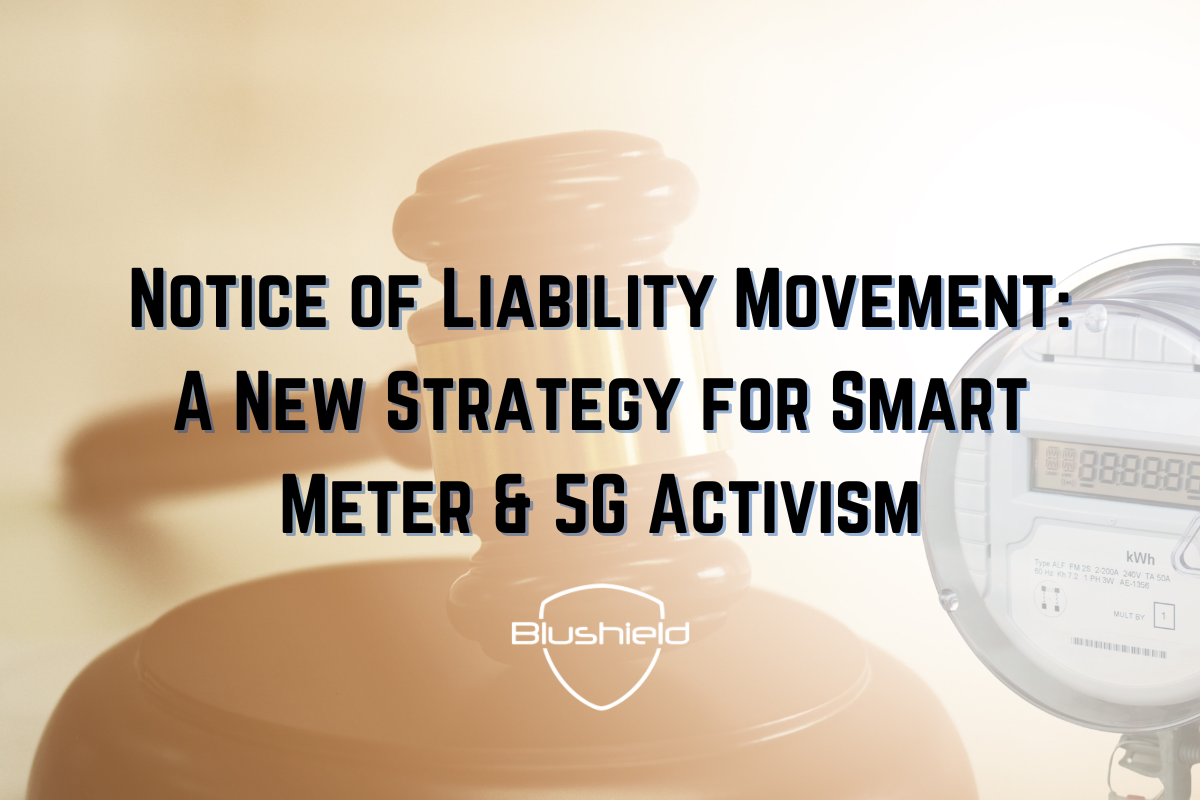
One of our primary goals with Blushield’s online presence, besides providing highly effective EMF protection devices, is to share valuable EMF-related information to help our audience become more educated and well-versed in all subjects related to electromagnetic fields.
An important part of this education is to share with you any and all progress on the front of EMF activism: men and women, just like you, standing up for their right to be free from forced exposure to harmful sources of electromagnetic fields, especially inside their very own homes.
Over the decades, there have been consistent attempts to take a stand against government and corporate policies that are not designed to protect our health, but instead prioritize government and corporate power and profits. Protests, speaking up at city council meetings, educating neighbors and rallying community members to get on board, and even expensive lawsuits are what many EMF-aware and especially EMF-sensitive men and women have invested their energy into each time a new harmful exposure source is thrust upon us, without our full knowledge of the potential harms involved, and without our explicit consent.
Unfortunately, many who fight these hard battles have found their attempts to be hard won, or thwarted entirely by an often corrupt legal system. Many of us have realized that government agencies are working alongside corporations, primarily motivated by money. There is a “revolving door” between individuals working for corporations (such as the telecom industry), and those working for the government agencies that supposedly regulate the industries these corporations are involved in. The most relevant example when it comes to EMFs is the shady association between the FCC (Federal Communications Commission) and the telecoms it is responsible for regulating.
To understand the depths of this alarming situation, you can read a 2015 publication from Harvard University’s Center for Ethics, titled Captured Agency: How the Federal Communications Commission Is Dominated by the Industries It Presumably Regulates.
The sad truth is that corporate entities and governments (which are also corporations) are primarily motivated by money. When they see small groups of angry citizens complaining about a new 5G tower going up in their neighborhood, or protesting that their old but perfectly functional analog electricity, gas or water meter got quickly swapped for a so-called “smart” meter, what they see is simply a threat to their bottom line.
While some individual men or women who work for government agencies may personally believe they care about human health, and may have the motivation of influencing policy in the direction of what’s “good for the people”, these intentions are undermined by the powerful momentum of Goliath governments who have entirely different motives. They see these groups of protesters as annoying flies that need to be swatted away and quieted as quickly as possible. Large corporate entities happen to be the primary lobbyists for government agencies, which quietly influence policy decisions towards the interests of these corporations.
What if there was a method of advocating for policy changes that support the health and well-being of living men and women, in a way that could more effectively get government and corporate attention, and create urgency through consequences involving money and personal liability?
Notice of Liability movement brings EMF activism to a new level of effectiveness
In 2015, a new movement and method of activism was born, initially in response to unwanted “smart” meter installations on homes. It is referred to as the Notice of Liability (NoL) movement, started by InPower co-founders Cal Washington and Josh del Sol. The techniques utilize a sophisticated understanding of the laws that all governments of the world abide by, which most common people are not currently versed in. Because of our lack of awareness, we unwittingly fall victim to the will of the corporate government, and unconsciously waive our own rights and power.
However, there are ways that we can play their game by following their own rules, which we were not taught in school or by our society. The Notice of Liability is a formal written document that can be sent in response to a harmful offer, and is the first of a series of documents. These documents are private contract negotiations utilizing the same principles used by corporations and governments to get you to agree to offers.
You may not be aware that when your utility company first sends you a letter telling you they’re planning to install a smart meter on your house, that is actually an offer to contract. However, because of clever wording, most of us interpret their letter as a statement of what they will do, rather than an offer awaiting our agreement. Because of this, most of us will not respond to this letter properly and honorably, and many will not respond at all, believing we have no power of choice over the matter.
In accordance with commercial law, our lack of response is interpreted as our agreement to the terms of their offer: this is legally called tacit agreement, and is a form of implied consent. A party's failure to object to certain actions may be seen as an implicit agreement.
Contracts are the lifeblood of the world of commerce. In accordance with the Uniform Commercial Code (UCC), which is the “rule book” for all commercial interactions, there are four steps essential to forming the simplest version of a contract.
The first step is the offer, which in this case could be a notice, or even a website, announcing a “meter upgrade”.
The second step is a mutual assent (or a meeting of the minds), which must include full disclosure of the relevant facts and terms, including the potential health and privacy consequences to the recipient of the offer. If there is not full disclosure, the contract is not legally valid.
The third step is unconditional acceptance. This means that both parties have agreed to every part of the contract – if there are any objections to any part of the contract, they should be presented through a conditional acceptance (or counter-offer), and the negotiations must continue until all conditions are agreed to by both parties. It’s important to note that consent can be gained tacitly, meaning silence or a lack of response is considered to be an unconditional acceptance to all terms of the contract.
The fourth and final step is ratification, which refers to the formal approval or confirmation of an agreement. This is gained by performance (the act of doing something based on the contract), which can involve monetary exchange, signing a document, through a statement of approval, or accepting the benefits of the contract. In this example, ratification can happen when a smart meter is installed on a property after the initial notice (offer) was sent directly to the individual or posted publicly, and the recipient tacitly agreed to it (did not respond properly, or at all).
There is another element essential to a contract, called consideration. This means each party must offer something of value (consideration) in return for the other party’s promise or action. The utility providers try to convince you that by installing a “smart” meter on your house, they are providing you with the benefit of frequent meter readings so you can monitor your own energy usage in “real time”. They will try to sell you on this, but surveys have suggested that most people do not want or need this. Also, the risks to our health, safety and privacy far outweigh this single proposed benefit, as we outline in our article all about smart meters.
To negotiate the conditions of the contract, we need to know how to speak their language to get what we want. We can respond to their offer with a Notice of Liability, which recognizes that a utility’s desire to install a “smart” meter is a contractual offer. We conditionally accept their offer in a written notice, but only on the condition that they provide definitive proof that the device is not harmful to human health, and does not violate privacy laws protected by the U.S. Constitution. This would require them to disprove, point-by-point, facts outlined in our affidavit (a document that we verify is true), with an affidavit of their own.
We can then go on to state that if they cannot provide this proof (which they won’t be able to), then we will allow them to install this meter, but require that they pay us on a fee schedule of a specific dollar amount (such as $10,000) per day to offset the potential harm to our health, safety and privacy caused by the meter’s presence on our house. Since you are the one negotiating the contract, you can choose the conditions you are willing to accept.
By sending an NoL, you are putting officials and executives on notice that they are involved with something that is causing harm towards you and your loved ones, and that you do not agree to it. Once they receive your NoL, they can no longer claim they did not know they were causing you harm.
The NoL process implements Contract Law, Common Law and Commercial Law (outlined by the Uniform Commercial Code). It is multi-faceted and operates in multiple jurisdictions. The power of this private contract negotiation is that it holds individuals who are enforcing or allowing the enforcement of this technology as personally liable for harm that may be caused by it. When this is not done, these people hide behind their governmental or corporate positions, with no “skin in the game” personally.
What happens when government officials receive your NoL?
According to commercial Notice of Liability processes, there are two more types of letters that can be sent to remind the recipient to respond: the Notice of Fault and Notice of Default. If there is no response (or an insufficient response to your conditional terms), and the action is taken anyway (the “smart” meter installed on your house), billing and enforcement can begin. Since the NoL is a private contractual agreement, it cannot be taken to public courts, but liens and debt collectors are options for enforcing the contract.
What has often happened since this movement began in 2015 is that a public official, after receiving one or more NoLs, has resigned or stepped down from their position immediately. Many officials do not want to be in a position where they may be personally financially liable for harm. Another common result of sending NoL letters is they do not go through with their offer – meaning no “smart” meter on your house. This is even more likely to happen when groups of people under the same utility district get together and all send NoL notices around the same time. There is strength in numbers!
Whereas petitions, protesting, attending public hearings, costly class action lawsuits, hiring attorneys or writing letters are often ineffective, the NoL process may be able to accomplish more.
When you read the examples below, keep in mind that in cases where public officials resigned after receiving an NoL, those may be cases of "correlation does not equal causation", and no one can be absolutely sure that their resignations were a direct result of the NoL process; just that both events occurred very near the same time, indicating the possibility of a link.
- One of the first groups to send NoLs to a local utility in Seattle, Washington were all able to keep their analog meters (although there was another group who were protesting just by bringing awareness to the issue who were also able to keep their analog meters).
- In Kelowna, British Columbia, more than 100 residents sent Notices of Liability to Corix Utilities’ CEO Brett Hodson. A few days later, immediately after receiving a Notice of Default, Hodson resigned from office.
- Len Kelsey, the chair of the BC Utilities Commission, resigned in 2015 after receiving NoLs.
- After being sent Notices of Default from 21 people, three of nine Seattle City Council members announced that they would not be seeking re-election.
- After being defaulted by 21 individuals, the Michigan attorney general began calling for free smart meter opt-outs.
- Four of the eight Michigan Public Services Commission officers being held liable are no longer listed on the Commission’s website.
- Michigan city attorney David Greim resigned after receiving NoLs, after informing one of the claimants that the utility company had a budget of $21 million set aside for paying off state legislators – more evidence supporting the financial connection between corporations and governments.
- Recent international successes include resignations from Scotland’s First Minister, as well as Ireland’s Chief Medical Officer, after receiving NoLs.
InPower has also received many direct reports of success from men and women using the NoL processes in being able to prevent “smart” meters from being installed on their homes. As of the time this article was written, the community has collectively served a combined total of 18 billion dollars worth of bills of exchange (negotiable instruments) to corporations and governments.
The InPower community also recently began utilizing the same processes to prevent the installation of 5G towers in residential areas.
InPower has a membership community for a low monthly fee that supports members in creating custom documents using templates, finding others in their area to work with to increase the impact of their NoL processes, and for further education on how all of this works. You can even join the community just to read and learn more about the processes, to get familiar and comfortable with how it works before taking action. You can read about the successes that others in your area have had, and communities throughout the world who are taking action.
All the InPower staff are volunteers, and the membership fees go towards maintaining the website.
One of the strengths of Blushield EMF protection is to create a bubble of safety around you and your family while you work to fight the bigger fight, if you are personally inspired toward activism. We think this particular strategy has considerable potential, as you are stepping more fully into your true power as a living man or woman, transcending older forms of activism that rely on pleading, complaints, and over-reliance on the court system.
This documentary is an excellent watch, to get a full overview of this movement:
InPower: A Mass Action of Liability
InPower is a worldwide movement securing life, liberty, and property for all through accountability. The InPower community is culturally, governmentally, and geographically diverse, but has a common bond: the need to have authority over one's health and home. Regardless of where you live in the world today, people have fewer choices when it comes to certain technology and services, and often have no choices when it comes to medical interventions with no recourse for bodily harm.

